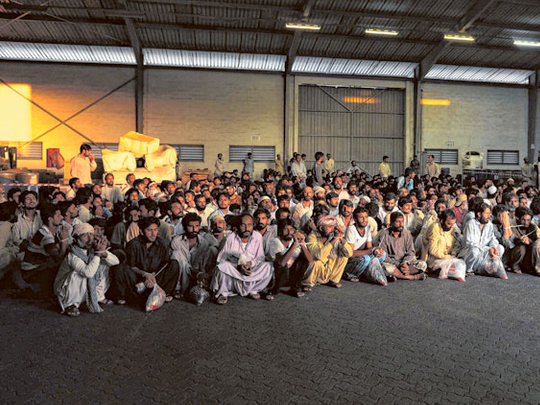
Muscat: The vigorous crackdown on illegal expatriates in Oman continued with the Royal Oman Police arresting 160 people on Sunday and deporting 174 infiltrators, mostly Pakistani nationals, by boat.
As a practice the ROP officials refrained from revealing the nationalities of those arrested and those deported by boat. However, it is believed most of them were Pakistani nationals.
In the past Pakistani nationals, as well as some Afghan nationals, have been sent back to their home country by boat in bigger numbers. Human traffickers exploit the long coast of Oman’s northern region to traffic poor Asian, mostly Pakistanis, workers. The traffickers take them by foot to Iran and then from Bandar Abbas smuggle them into Oman by boats.
Oman’s Coast Guard have repeatedly foiled such attempts but the 1600km-long coast makes it nearly impossible for the authorities to stamp out the scourge of human trafficking.
Omani authorities have in the past offered amnesty for illegal expatriates to exit the country without paying any fines. However, after the 2010 amnesty offer, the authorities have intensified their campaign against the illegal workforce as well as those trying to infiltrate. Some attempts are foiled while others are caught during periodic raids in different parts of the country.
“Those deported were expelled only after due judicial process,” Captain Nasser Bin Abdul Rahman Al Abri of Royal Oman Police, said.
He also reiterated that the police had coordinated with the respective embassies to establish the identities of the infiltrators before being deported to their home country.
He praised ROP officers and also commended citizens as well as some residents in reporting illegal residents.
Captain Al Abri warned that the authorities will not tolerate anyone harbouring, employing or sheltering infiltrators or those violating the country’s residency laws. “Those aiding and abetting illegal residents will also be tried in the court of law,” he cautioned.
He said the infiltrators are usually involved in crimes such as robbery and also violate the country’s telecommunication laws by providing illegal phone networks. “They are also majorly involved in drug trafficking in the country,” he revealed.
Captain Al Abri underlined the health hazards infiltrators posed to the citizens and expatriate residents in Oman. “They do not undergo medical check-ups therefore are prone to spread infectious diseases in the country,” he added.
Besides the infiltrators, Omani authorities are also concerned at the rise in the number of expatriate employees absconding from their employers in violation of the country’s residency laws.
The number of expatriates leaving their employers rose 15.5 per cent in the first half of 2012, according to statistics released by the Ministry of Manpower.
As many as 8,382 expatriates left their employers in violation of the Labour Law and its ministerial decisions in the first half of 2012, an increase of 15.5 per cent over the same period in 2011.
The number of illegal workers from January-June 2012 stood at 7,296, of which 2,448 were detained, an increase of 49 per cent over 4,885 offenders in the corresponding period of 2011. The number of illegal expat workers detained in the first half of 2012 rose 51 per cent to 5,402 as compared to 3,569 last year.












